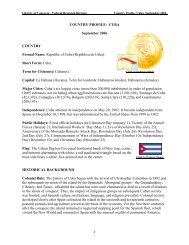1 - American Memory
1 - American Memory
1 - American Memory
You also want an ePaper? Increase the reach of your titles
YUMPU automatically turns print PDFs into web optimized ePapers that Google loves.
16<br />
problem—our unique vulnerability to surface transportation stoppages<br />
involving the west coast-Hawaii trade<br />
In 1971,1 had introduced S. 2836, the Hawaii Public Interest Pro-<br />
tection Act. This subcommittee held 3 days of hearings on that measure<br />
in January 1972 in Honolulu.<br />
Those hearings demonstrated the extent of the problem—they pro-<br />
vided ample documentation of the acute need for relief from such<br />
stoppages in the future. They demonstrated that even the threat of<br />
stoppages caused deep and enduring damage to the people of Hawaii.<br />
The problem cried out for solution.<br />
Those hearings also demonstrated that the proposed solution pro-<br />
vided in S. 2836—Government operation of the Hawaii-west coast<br />
shipping with ships and workers not involved in the dispute, was not<br />
a workable solution.<br />
As a result, on January 6 of this year, I introduced S. 231, which<br />
would have placed a 60-day moratorium on the imposition of any west<br />
coast stoppage of the Hawaii trade.<br />
The measure under consideration here today, S. 1566, is a refine-<br />
ment of those earlier measures. It is the result of numerous comments<br />
on the earlier proposals and of our continuing efforts to find a workable<br />
measure which would do the job and command the unanimous support<br />
of Hawaii's congressional delegation as well as that of the other polit-<br />
ical and economic interests in Hawaii.<br />
It is also faithful to several principles which I consider essential<br />
to any solution to our problem.<br />
It recognizes that our problem is unique. It is one which is shared<br />
only by the other U.S. islands of the Pacific. Those areas are included<br />
under its provisions.<br />
It recognizes the principle that we should interfere as little as pos-<br />
sible, consistent with our objective, with the normal economic forces<br />
which are operative in labor-management negotiations.<br />
It recognizes further that any measure of interference in labor-<br />
management disputes must be an even handed one. Any interference<br />
must be to the advantage of neither labor nor management.<br />
The west coast-Hawaii trade constitutes some 3 percent of total<br />
longshore hours worked, 7 percent of shipboard labor, and less than<br />
13 percent of the vote in the Pacific Maritime Association, the man-<br />
agement interest in the west coast trade.<br />
It recognizes that the mere and recurring threat of stoppage itself<br />
causes great economic damage as merchants and other economic in-<br />
terests in Hawaii seek to gird against any stoppage by expensive<br />
stockpiling of merchandise. Warehousing costs in Hawaii are 250<br />
percent of mainland costs according to a recent study.<br />
S. 1566 recognizes that any proposed solution must not only be<br />
fair and reliant on normal labor-management economic forces but it<br />
must also be one which can be readily implemented. The proposed<br />
solution is one which has been regularly utilized on a voluntary basis<br />
to transport military supplies during previous shipping stoppages.<br />
This measure meets the necessary criteria of having broad support.<br />
In addition to the unanimous support of the Hawaii congressional<br />
delegation it has the support of the Governor and the mayors of our<br />
counties.



![Albert Einstein Papers [finding aid]. Library of Congress. [PDF ...](https://img.yumpu.com/21604228/1/190x245/albert-einstein-papers-finding-aid-library-of-congress-pdf-.jpg?quality=85)





![American Colony in Jerusalem Collection [finding aid]. Library of ...](https://img.yumpu.com/17941275/1/190x245/american-colony-in-jerusalem-collection-finding-aid-library-of-.jpg?quality=85)



![Piccard Family Papers [finding aid]. - American Memory - Library of ...](https://img.yumpu.com/17941234/1/190x245/piccard-family-papers-finding-aid-american-memory-library-of-.jpg?quality=85)


